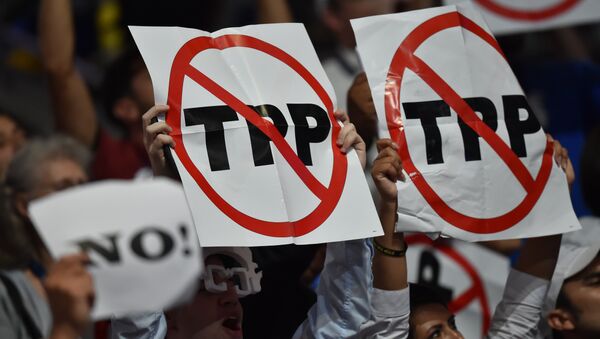New Delhi (Sputnik): US President-elect Donald Trump's announcement on Tuesday that his country will exit the Trans-Pacific Partnership (TPP) may have sent tremors across the signatories of the multilateral Pacific-Rim trade deal, but the mood in New Delhi is one of relief and cautious optimism.
"On trade, I am going to issue a notification of intent to withdraw from TPP, a potential disaster for our country. Instead, we will negotiate fair, bilateral trade deals that bring jobs and industry back on to American shores," Trump had said in a short video message posted from his Twitter handle on Tuesday.
.@transition2017 update and policy plans for the first 100 days. pic.twitter.com/HTgPXfPWeJ
— Donald J. Trump (@realDonaldTrump) November 21, 2016
India may be the unintended beneficiary if the US under the Trump Presidency dumps the TPP and switches back the focus to the World Trade Organization (WTO), says an anonymous senior commerce ministry official. This brings into prominence the China-led Regional Comprehensive Economic Partnership (RCEP) agreement that excludes the US.
"There was pressure from Japan and other common member countries to make the RCEP as ambitious as TPP in intellectual property rights and investment, which India was opposed to. We hope such pressure will subside now," said the official, cautioning that India is closely watching the still-developing situation.
The TPP is a trade agreement between 12 major Pacific Rim nations-Australia, Brunei, Chile, Canada, Japan, Malaysia, Mexico, New Zealand, Peru, Singapore, the US and Vietnam-which collectively account for 40 percent of the world's gross domestic product (GDP).
RCEP comprises the 10 Asian countries (Brunei, Cambodia, Indonesia, Laos, Malaysia, Myanmar, the Philippines, Singapore, Thailand and Vietnam) and six of its free-trade partners (Australia, China, India, Japan, New Zealand and South Korea). They account for nearly 45 percent of the global population and a combined GDP of $21.3 trillion.
New Delhi’s bigger worry, however, is that China, which leads the RCEP, may become the region’s biggest economic power. Beijing has excluded Washington from the RCEP and is opposed to India’s demand for greater market access within the regional trade grouping.
"If China agrees to lead TPP, it could be a more difficult situation for India. We should wait and watch the developing scenario. We should not lower our guard," cautioned Biswajit Dhar, professor of economics at Jawaharlal Nehru University.



